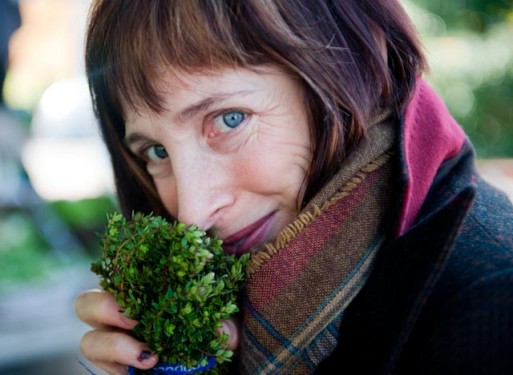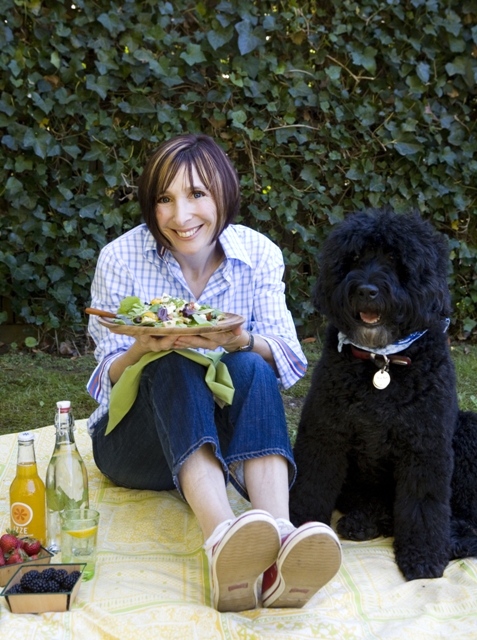Rebecca Katz is a chef and nutritionist who specializes in cooking for cancer patients and survivors. She is Executive Chef at the Center for Mind-Body Medicine’s Food As Medicine and CancerGuides Professional Training Programs, and is visiting chef and nutrition educator at Commonweal’s Cancer Help Program. Her latest cookbook, The Cancer-Fighting Kitchen, offers recipes and ingredients that help people thrive during treatment. SevenPonds spoke with Rebecca about her work.
Liz: Tell us a bit about what you do.
Rebecca: I am a cookbook author, chef, and nutritionist, as well as a culinary translator. This is a phrase I coined: basically, someone who can take all this nutritional science and translate it into tasty bites of yum, boil it down to foods you would want to eat.
 Liz: How did you become a culinary translator?
Liz: How did you become a culinary translator?
Rebecca: I really got into the world of cooking for people who have cancer when my father was diagnosed in 1999. At that point, I was a trained chef, and yet I didn’t have a clue how to cook for someone who was ill. That was my boot camp training. Then the director of Commonweal’s cancer program called me in 2000 when their chef couldn’t make a retreat. As soon as I went and cooked at Commonweal, I found that this idea of nourishing people, whatever stage they were at, was the most important work I could do in the world of food. That’s how I really got involved in the cancer and chronic illness world: helping people find where their nourishment lies. That could be at any stage, thriving, surviving, living another 20 years, or dying.
Liz: Can you describe how food can be linked to health and cancer treatment?
Rebecca: It’s so critical, because during treatment your body is using up a lot of energy, being bombarded with chemo, radiation, medication. Nutritionally you’re really being challenged. The best thing you can do is give your body as much good nutrition as you possibly can. That will mitigate your side effects, improve your treatment outcome, and improve your quality of life. Oftentimes, chemo leaves you with unwanted case changes that can be mitigated by just using a few tools in your pantry. People may say, why do I want to think about food when I feel so yucky? But that’s the very time you want to bring in nutrient-rich food, so your body has a way of healing itself.
In terms of survival, once you’re done with chemo, food can be your greatest arsenal. Nutritional studies now show that many of the whole foods we can eat actually talk to our octogenes, change our gene expression. NFKB (nuclear factor kappa beta) is a protein complex involved in the immune and inflammatory process. Having incorrect regulation of NFKB is thought to play a role in many diseases, including cancer. So NFKB is ordering your cells around, maybe not acting in your greatest good, and healing herbs and spices can come in and put the kibosh on it. Food is really incredibly powerful. At a time when you feel so out of control, to know what you eat can really make a difference: that’s when you have control, power. Sometimes the littlest things can have the biggest impact.
Liz: On your website, you have a Culinary Rx section that provides a comprehensive list of ingredients with great health benefits. Which foods do you most highly recommend for people undergoing cancer treatment?
Rebecca: Mint and ginger for sure. Mint has some very powerful phytochemicals that can quell inflammation. You can drink mint tea, chop some mint in your salad; you don’t need very much. Ginger inhibits NFKB and quells nausea, helping to stimulate appetites that aren’t there. Drink ginger tea or put ginger in things. The cruciferous vegetables: broccoli, kale, cauliflower, collards, arugula. They are very high in sulforaphane, a well-studied phytochemical that is helpful in dealing with cells gone amok. Garlic and onions are superfoods. And as far as fruits go, I would say the dark berries are really wonderful.
Liz: What results can cancer patients expect to see from the foods and recipes you recommend?
Rebecca: They’ll be able to eat, when they thought they might not be able to. Basically, the recipes are designed to be what I call nutrient-dense, which means that every food, every ingredient in the recipe plays a role—no empty calories. I use a lot of herbs and spices, which tickle the taste buds, even as people are going through treatment and experiencing transient taste changes.
Recipes are designed to include the right amount of good, healthy fats, the right amount of acids, the right amount of sea salt, the right amount of sweet. They are designed to use nutrient-dense foods and be balanced, and when they hit the taste buds, to really come alive and become interesting. The best recipe in the book for anyone with any kind of illness is the Magic Mineral Broth: when you feel like just can’t eat anything, but you need to be nourished or hydrated, it has everything. It’s like taking your body to an internal spa. And if you can’t make it yourself, you can recruit someone to make it for you. Remember that when people are sick, others really want to help but don’t know how, so if you give them a concrete path—can you make this broth for me and put it in small containers?—that’s very empowering.
Liz: Finally, what words of advice can you leave our SevenPonds readers with, who may be dealing with cancer, caregiving, and end-of-life?
Rebecca: I think one of the hardest things is when you’re watching someone who is sick; our inclination is to want to force people to eat. Food is an emotional issue with a lot of charge behind it. But someone may not always be able to eat a whole plate of food. We think, if you don’t eat you’re not going to get well; if you lose weight you’re going to die. There’s a lot of projection that a caregiver might place on someone who is going through treatment. So I just caution and say, have things available, give things in small portions. People will come to food in their own way.
That’s the magic of nourishment. When people are not feeling their best, sometimes it’s a broth that will get people connected back to food in some way… it could even be a potato chip! It’s hard to say. As caregivers we should just try hard to be flexible. Caregivers also need a culinary support team of people they can call upon to take on some cooking roles. Caregivers need to be nourished too. The more direction you can give them in handing off the recipe, the better.
I have seen people passing on: one woman, all she wanted was French toast, and her family told her she could not have it—it was too high in sugar, carbohydrates, not good for her. I said, wait a minute! This is what she wants! She is passing, she should have the best French toast she could have! Whether it’s life-affirming, using food to heal and move on, a last bite: the role of food is to be nourishing.

 An Interview with Rebecca Katz
An Interview with Rebecca Katz



 Our Annual Seven Holiday Gifts for Someone Who Is Grieving, 2024 Edition
Our Annual Seven Holiday Gifts for Someone Who Is Grieving, 2024 Edition
 “Making Mobiles” by Karolina Merska
“Making Mobiles” by Karolina Merska
 “Hands Up to the Sky” by Michael Franti & Spearhead
“Hands Up to the Sky” by Michael Franti & Spearhead















Rebecca’s book One Bite at a Time really helped me cook for my wife who was ill with breast cancer. I had a friend who knew of her cookbook recommend it to me. I admit we did not have the best of eating habits. The cookbook helped us in a good direction to eat better and enjoy food as it should be.
Report this comment